Doing More with Less:
Dr. Emily Dow and Doctors of the World in Chiapas, Mexico
Global access to quality healthcare remains one of the world's most prevalent concerns, especially when considering populations that have been neglected and underserved. The focus is often on bringing needed help to these populations. For Doctors of the World (DOW), the focus has evolved to include facilitating sustainable access to healthcare within that particular community.
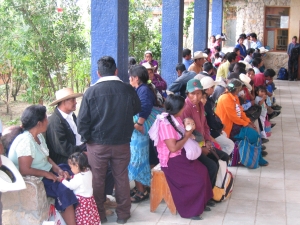
According to Tom Dougherty, Executive Director of DOW, "When we began in 1990, we were very much limited to sending American volunteers to places to provide basic humanitarian aid and assistance. And what we saw in our experience over time was that we wanted to address the fact that, while that is good and it's helpful, there was an even greater need to work closely with communities to make sure that access was sustainable, that it did last beyond the time we were able to provide volunteers."
The Community Health Project in Chiapas, a state in southern Mexico, stands out as a shining example of such work.
How it Began
The partnership between DOW and the Hospital San Carlos in Altamirano, Chiapas, began in 1994 when the Zapatista uprising led to the mass departure of local healthcare workers in response to the unrest and violence. Nearly half of the citizens in Chiapas are indigenous Mayan, and a quarter of the population does not speak Spanish. With a history of neglect and discrimination, this community already suffered from high rates of malnutrition, maternal mortality, and tuberculosis. The exodus of medical professionals further deprived over 900 indigenous communities of access to medical care.
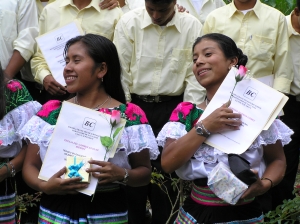
While the immediate response of DOW was to send volunteers to meet the increased need for healthcare in the area, Dougherty said that volunteers came back asking "How can we make things better all the time, not just when we're able to be here? Who in the community can be engaged and used to address some of the most pressing health crises?" The experience of those initial volunteers also brought to light the problems of maternal/infant mortality and the obstacles of language and cultural barriers for indigenous people to healthcare resources.
As a result, DOW created a program with the hospital that allowed volunteers to work with and train hospital staff and midwives to improve obstetric and prenatal care. In addition, these volunteers also train local indigenous women as nurse auxiliaries to work at the hospital. These women speak both Spanish and indigenous languages, thus bridging the language gap between the hospital staff and indigenous patients.
DOW sends two to three volunteers to Chiapas each year, and these volunteers have helped train 50 nurse auxiliaries, some of whom went on to become full-fledged nurses. These volunteer physicians help to care for the patients in targeted indigenous communities (which total over 26,000 people); the Hospital San Carlos has over 12,000 patients annually.
Experiences of a Volunteer Physician
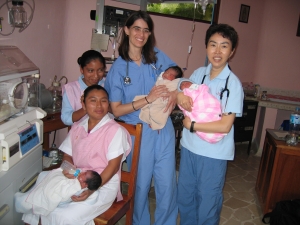
Dr. Emily Dow, an associate clinical professor in the School of Medicine at the University of California at Irvine, has worked with DOW in Chiapas since 1999. Dr. Dow was immediately interested in working in Chiapas, given her fluency in Spanish. The unstable environment in Chiapas did not alter her resolve to give of herself.
"I guess my calling has always been to be in an area where I'm needed the most," Dr. Dow said. "Treating the sickest of the sick, the poorest of the poor, that's why I went into medicine in the first place."
She was warned that the area was medically disadvantaged before her initial trip. While she found that to be true, she also discovered enjoyment in that challenge, which was aided by her training in family medicine. "I had to really draw upon everything I'd learned and known to treat some of the diseases that I saw, and some of the illnesses I had never encountered in [the U.S.]. So there was a lot of learning that took place at the beginning, and I continue to learn every time I go down [to Chiapas]," she said.
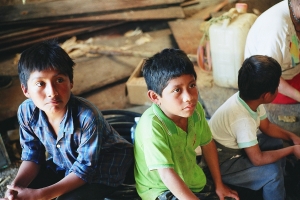
Dr. Dow stayed in Chiapas for five months on her first visit. Her annual visit to Chiapas now lasts for one month, and she brings a family medicine resident with her. During her stay, encounters with tropical diseases like typhoid fever, tuberculosis (TB), malaria, and parasitic infestations are common. Many US physicians have only seen these illnesses in books. Even within Mexico, comparisons between Chiapas and places like Cancun and Acapulco highlight the disparity in living standards and health problems. It also underscores the importance of sustainable health care in this area and globally.
In Chiapas, Dr. Dow works at the Hospital San Carlos, which has existed since the 1970's and is run by nuns. Dr. Dow stated that the nuns "do an absolutely wonderful job of keeping it efficient and organized, along with the Mexican doctors that they hire, and the nurse auxiliaries." The nurse auxiliaries, often young Mayan women, serve as both aides to the doctors and nurses and interpreters for indigenous patients, which helps facilitate patient care.
Integrating Modern Medicine with Traditional Practices
It is common for indigenous patients to be accompanied by family members who are involved in the decisions and care for the patient. This close-knit community atmosphere can prove very beneficial when the patient and family understand the treatment and work with the medical staff to help with the process.
"If we all come to an understanding, it really creates that sense of community that we're all working together to make the person better. It makes things infinitely easier," Dr. Dow said.
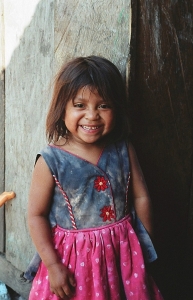
This type of effort has made the hospital a trusted source of medical care to the indigenous community, with patients coming to the hospital from miles away, even traveling for days at a time. This is even more significant considering the distrust much of the Mayan population has for the government hospitals due to the exclusion they have experienced.
Patients and their families sometimes seek the services of a curandero, or traditional healer, if they believe the patient is not recovering fast enough. While some may find this frustrating, Dr. Dow emphasizes the importance of cultural respect. She said, "What we have to do, in many of the cases, is agree that there might be some benefit. We cannot just discount the powers of a curandero outright because then we would lose credibility ourselves. We have to respect their culture and their beliefs as well....You have to work within their cultural beliefs."
She has seen cases in which cooperation and cultural respect between the medical staff, the patient and family, and a curandero have resulted in unusual, yet successful, treatment plans. In one instance, Dr. Dow treated a young boy with typhoid fever; the patient's family felt his condition resulted from his falling into the river, which they viewed as a susto (an incident that causes fear). After a few days of antibiotic treatment, the boy's family wanted to have a curandero treat him by taking him into the river. Dr. Dow agreed, asking that the family bring the boy back afterwards so that he could receive the rest of the antibiotic treatment. The family complied and the young man's treatment was continued.
The TB Project
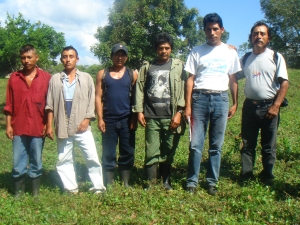
In addition to the Community Health Project, DOW continues to work for the people of Chiapas in the Tuberculosis Control Project, which addresses the high rates of tuberculosis in the region. The program is a partnership between DOW and the local indigenous communities to utilize promotores, or community health workers. The promotores are trained to educate the community about TB, to offer referrals for those who need treatment, and to serve as health system liaisons and advocates for patients and the communities.
The goal of the TB control project is to educate people about the disease and enhance the rates at which people seek and complete treatment. This program also strengthens the relationship between the public healthcare system and the indigenous communities, so that people are more aware of the available resources and their own rights.
Additional Benefits
Generous work like this is not uncommon to Dr. Dow. She also works as the Assistant Director of the UC Irvine Family Health Center, which serves the uninsured and underinsured in Santa Ana, CA. In this setting, Dr. Dow finds that her experiences in Chiapas have honed her ability as a physician to look for diagnoses that may not occur to those who have not worked in developing countries. "It rounds me out as a physician," she said.
She also notices the difference in accountability with respect to patients. Dr. Dow recounted an incident in Chiapas in which a young man who was HIV-positive was directed to a local government agency (the only places that dispensed HIV medications) to get the drugs he needed. When he returned to the hospital, Dr. Dow saw him and found out that instead of dispensing medicine, the government worker he spoke with dispensed condemnation for his lifestyle. As a result, he left and did not get his medication.
Dr. Dow said, "I spoke to him and I said, 'When you get treated like that, you have to speak to the supervisor.' But then I was thinking, what if that person was the supervisor? We have recourse here. We can talk to lawyers. We have activists, community advocates. Who is advocating for them? Who is advocating for these people who have nowhere else to go, who don't know about lawyers, who don't know about their human rights?" Dr. Dow suggested that the young man return to the agency with a promotor, and he agreed.
Pressing Forward
Situations like this illustrate the great need for programs like the Community Health Project and the Tuberculosis Control Project to remedy the neglect and marginalization the indigenous population has suffered. These programs also underscore the importance of medical professionals who are committed to this type of effort. Though the work of a medical professional is always challenging, places like Chiapas remind one of just how challenging it can be. Regardless of how daunting the task may seem, Dr. Dow and others like her push on.
"Medical care or health care should be a human right, and it really isn't, still," Dr. Dow said. "There are lots of roadblocks, there are lots of challenges, but we have to just move forward and try to do the best we can for the people that we can help."
About the Author
Rashada Alexander was a postdoctoral scholar in the Department of Microbiology at the University of Alabama at Birmingham, and a freelance biomedical writer and editor.
About Angels in Medicine
Angels in Medicine is a volunteer site dedicated to the humanitarians, heroes, angels, and bodhisattvas of medicine. The site features physicians, nurses, physician assistants and other healthcare workers and volunteers who reach people without the resources or opportunities for quality care, such as teens, the poor, the incarcerated, the elderly, or those living in poor or war-torn regions. Read their stories at www.medangel.org.